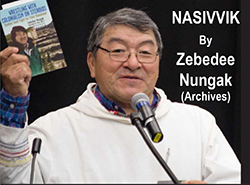
NASIVVIK By Zebedee Nungak,
Windspeaker Columnist; Archives 2004
Nasivvik is an Inuktitut word that means vantage point. It can be a height of land, a hummock of ice, or any place of elevation that affords observers a clear view of their surroundings to make good observations.
Nowadays, even small villages in the Arctic are connected to the endless cyber-destinations of the Information Superhighway. Previously unthinkable, this provides reliable communications by Internet and e-mail to every corner of the world. Unfortunately, these conveniences also provide opportunities for fraud artists to ply their trade, and Arctic isolation no longer provides immunity.
Through e-mail, scam artists are constantly circulating offers of money, adding up to millions of easy dollars, all to be had without any strenuous exertion. These appear to be chances to get filthy rich very quickly without the bother of buying lotto tickets, or "rolling the dice" in some other form of gambling. Mind you, these are millions of non-existent dollars, offered in quick-money schemes by specialists in fraud brazenly appealing to raw greed.
E-scam pitches stand out by some identifiable features. They're sent, supposedly, from foreign countries like Nigeria and Senegal. If one is to believe this, there is extreme wealth amidst the extreme poverty we often see on TV documentaries and news reports from Africa. Their senders pose as senior accountants who have found great sums of money just laying around as a result of regime change from military dictatorship to civilian rule.
There are other variations explaining how these people came across these fortunes in money, which sound all too good to be true. It appears that you've hit a jackpot without inserting any coins, or pulling any levers. An old saying dredges itself out of obscurity from one's memory: "If it sounds too good to be true, it very likely is." Now, all that these people want is for you to reveal your bank account number to transfer these riches to you.
Out of curiosity, I tabulated the ones I've recently received. The stingiest offer was 10 per cent of $12.5 million, while the most generous one was a vague 60/30 proposition on $32 million, with 10 per cent set aside for "contingencies." Just to be conservative, I assumed my cut to be 30 per cent, which would have me becoming $9.6 million richer. My haul, just from a few offers, would've totaled a tidy $21,725,000. Quick, easy money, indeed!
Reading these pitches more carefully reveals that they are written in sloppily spelled, improperly punctuated English. Proper grammar and syntax are glaringly absent from the writings of these supposedly rich people with millions to practically give away.
“...We are interested in transferring this funds that are presently floating and lying idle in a suspense account..." I'm tempted to reply, "Unfortunately, I don't deal in suspense accounts. I will, however, accept sinking funds in vigorously active thriller accounts..."
People who claim to be this rich ought to be able to hire competent writers to at least smooth out the language of enticement. Now, look at how generous they are.
We have resolved to give you 25 per cent of the total sum for your assistance.
This raises the question: Why only 25 per cent if the scheme can't go anywhere without me?"
Again, I'm tempted to reply:
“Sir, My level of greed is much higher than your offer. I will only accept 75 per cent of the cut, while you can have 25 per cent.”
Meandering, convoluted, nonsensical sentences end up as a confusing heap of words.
“...the Company came into full working capacity during current civilian dispensation as a working/asset capacity USD2Billion on the completion of the fifth part. You can authentically apply for supply if it interest you to be our client with full guarantee from me."
I'm scratching my head, wondering, the fifth part? Of what? And how on earth can one "apply for supply" un-authentically? With a full guarantee from a fraud artist, no less.
In attempts to flatter and dazzle, important-sounding names and titles are flung about to the point of overkill:
The money USDM8.3M has been proved for payment by this company NLNG. The Federal Ministry f Finance (Endorsed by the Accountant General of the Federation) and to be paid by the Apex Bank under Contract Number NLNG/FGN/FMF/CBN/C987/02.
Reading such clutter, one goes from being impressed to being dumbfounded in one quick take.
Processing such pitches hones the edge on several of my basic instincts. Human conscience and Eskimo intuition immediately ring loud alarm bells upon reading the scam-scheme. Easy money begging to be taken appeals to greed, but never smells right.
The offer of huge sums of money is the usual bait in the effort to entice a victim to provide bank account numbers, phone and fax lines, and other personal information to total strangers.
The warning here: Don't let proposals from Africa soliciting your participation in highly dubious financial transactions quicken your heartbeat. Think. Can any of us recall hearing testimonials from honest people who have gotten rich quickly from overseas sources stumbled upon by e-mail?
It's all a scam-uiviiqriniaruti in Inuktitut.
